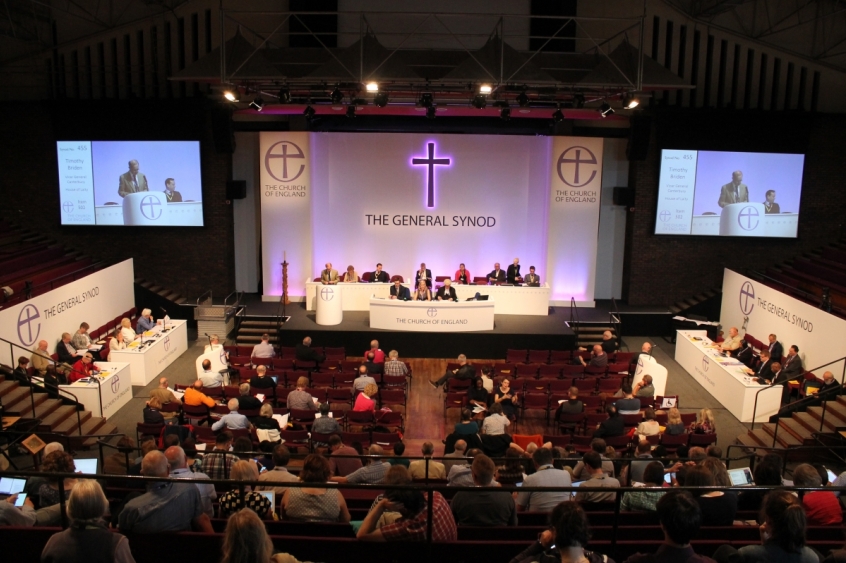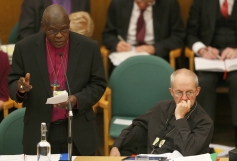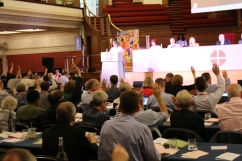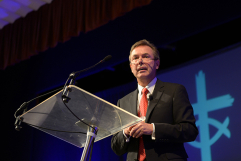A small group of conservative Anglicans will boycott the Church of England's private talks on sexuality in a reflection of intense divides within its governing General Synod.
Three days of secret conversations begin on Sunday until Tuesday in an effort to reconcile warring factions within synod on gay relationships. But a handful will refuse to take part because they say to do so would be to admit that different positions within the Church were possible.
Christian Today understands the number boycotting the talks will be about 10, out of nearly 500.
One of that number, Charlie Skrine, told Christian Today he was part of a "large group" who "feel this is not an issue where the Church can come together and live alongside each other in a compromise". He added within that larger group are a smaller group who "are worried unless we step back from the process we will be heard as already saying, 'that is fine, let's do it [accept a change on the church's teaching on gay relationships]". Skrine is one of the conservatives on synod who would not accept any accommodation for gay relationships within the Church.
The main problem for Skrine and his colleagues is that for him and many other conservatives, the issue is not one Christians can agree to disagree over.
"I think there is a shared concern that in six months time, if we do take part, there will be an assumption we can find a compromise that everyone can live with," he said.
"It's not that I don't want to talk," he added. "So if there is a way to have conversations around the edges I would love to be part of that. I enjoy talking and I think it is really useful."
Those considering walking out of the talks are far from a majority, even among those who consider themselves evangelical. Clive Scowen, another synod member opposed to a change in Church teaching on gay relationships, told Christian Today: "I can't see a downside to taking part, providing we are clear on what basis we are doing so. That basis is not that we are saying we can live with any outcome or we that we will walk together come what may."
But the dissent from some conservatives reflects a feeling the Church's talks are drifting out of their control. Many think the "momentum" is in the other direction. Indeed that perception is one area where some conservatives and liberals agree. Rev Andrew Foreshew-Cain, the only openly married gay member of synod, said he was "encouraged by the number of people showing support [and] talking of the need for change".
He wrote on a Facebook post to the gay-affirming group Changing Attitude on Saturday: "Time to start talking not of accommodation for us, but for recognising the majority and to start talking about how to accommodate those who are now in the minority on sexuality."
He continued: "No longer are we to petition for crumbs. We are need to state loudly that, as has been said 'the arc of history is towards justice'. And that justice is here and needs to be recognised."
Aware of the move to undermine the talks, a number of bishops have put pressure on synod members to attend. The Archbishop of York pointed to Lambeth 110, a Church document that affirms marriage as solely between a man and a woman but "which says we must listen to the experience of homosexual people", said Sentamu. "How can we do that without shared conversations?" he added. "As a Church we must have a maturity of listening."
The Bishop of Willesden, Pete Broadbent, told the synod chamber: "If you are thinking of boycotting the conversations because they will compromise you in some way then I would say we particularly need to hear your voice."
A change in Church doctrine requires a two-thirds majority in its ruling synod. But between a quarter and a third of members would not accept any change on the Church's official position, making a redefinition of marriage unpopular if not impossible
Christian Today has revealed that one of the ways the Church may find a compromise over the issue is through a "pastoral accomodation". This could take the form of an authorised service of "welcome" or even blessing for people in same-sex relationships, but not an official marriage.

Oliver O'Donovan, a theologian who was among the first to propose the idea, told Christian Today "untraditional forms of marriage" had been adopted "without modifying or qualifying in any way the teaching of the church about marriage as the union of one man and one woman for life".
He cited polygamous households in African churches and divorced couples in Western churches as two examples of a departure from traditional Church teaching. He said these models do "not undermine the natural family as a norm, but affirm it, by modelling itself as closely as possible upon it, so the well-designed pastoral accommodation in marriage, designed to meet a quite specific need, will witness in its own way to the normative form from which it derives".
Senior members of the Church have admitted their attempts at reconciliation through the talks may fail. The Archbishop of Canterbury's chief of staff David Porter, who runs the "shared conversations" programme, has recently said they may not prevent a split. "Shared conversations should not be measured on its ability to stop a fracture," he said. "Every Church that has tried to address the issue of sexuality has fractured in some way.
"This is about raising the capacity of the Church to have a genuine conversation."
A Church of England source said: "Whether people participate is a choice for them. The invitation remains open to all. Conversation offers an opportunity to listen and share shared between brothers and sisters in Christ. There is nothing to fear."
In the meantime the United Reformed Church has voted by an overwhelming majority to allow local churches to register for and conduct same-sex weddings. The decisive move, passed by 240 votes to 21, means the final decision over gay relationships lies with the local church.

















